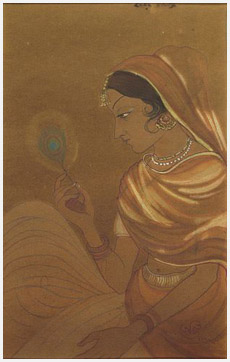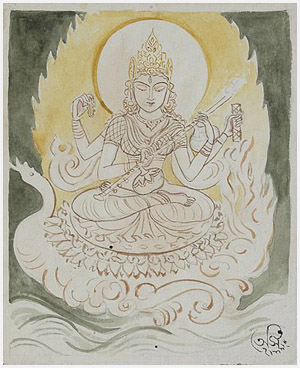ASIT
KUMAR HALDAR
|
| |
|
| |

1890 - 14/02/1964

|
| |
|
| |
|
|
|
 |
Artist Profile |
BEGINNINGS
He was born in Calcutta, West Bengal. Famous as a painter
yet a versatile artist, widely acknowledged as revivalist
of tradition but very progressive in outlook and approach
to art and life, Asit Haldar had a rich wealth of styles,
techniques and themes in a variety of his works scattered
all over India and abroad. Halder proved his creative
talents quite early in his life. He had his roots in
the rich cultural heritage of India. He tried to rediscover
the canons of Oriental Art through his works the lines,
the form, the colours, and above all, the spirit. His
paintings have a strong poetic content, which touches
one`s feelings deep. Even a man like Rabindranath Tagore
drew inspiration for his poems from Haldar`s work, specially
his sensitive brush drawings of lyrical scenes from
village life. Inspite of exacting copies he had to execute
of fresco painting at Ajanta caves between 1909 and
1921 with Lady C.J. Herringham, his own style of work
remained unaffected
|
| |
EDUCATION
- 1906-10 Student of Abanindranath Tagore and Leonard
Jennings, Govt. College of Art and Craft, Calcutta.
EXHIBITIONS
- 1908, 10, 12 Exhb., Indian Society of Oriental Art,
Calcutta.
- 1909 Indian Society of Oriental Art exhb., Simla.
- 1911 Indian Society of Oriental Art, United Provinces
Exhibition, Allahabad.
- 1911 Festival of Empire, Crystal Palace, England
(Organized by Indian Society of Oriental Art for George-Vs
Coronation).
- 1914 22nd Exhb. of Societe des Peinters Orientalistes
Francaise Grand Palaise, Paris.
- Traveling to Belgium and Holland and Imperial Institute,
England.
- 1924 Traveling exhb. of the USA, organized by the
American Federation of Art and Indian Society of Oriental
Art.
- 1928 Exhb., Athenee Gallery, Geneva, Switzerland.
- 1930 Retrospective, Lalit Kala Akademi, New Delhi.
- 1938 Inaugural exhb., Haldar Hall, Allahabad Museum,
Allahabad.
- 1990 Retrospective in his honour, organised by Lalit
Kala Akademi, New Delhi.
- 2003 Manifestations, organised by Delhi Art Gallery,
World Trade Center, Mumbai and Delhi Art Gallery,
New Delhi.
- 2004 Manifestations II, organise
COLLECTION
- Academy of Fine Arts, Kolkata.
- Allahabad Museum, Allahabad.
- Indian Museum, Kolkata.
- Lalit Kala Akademi, New Delhi.
- National Gallery of Modern Art, New Delhi.
- Rothenstein Museum, London.
- Victoria and Albert Museum, London.
- Delhi Art Galley, New Delhi.
AWARDS
- 1934 First Indian Fellow of the Royal Society of
Art, London.
- 1938 Haldar hall was inaugurated at the Allahabad
Museum, Allahabad.
STYLE
Asit Kumar Haldar`s creative imagery is ceaseless.
His art is not an abstruse expression or inticulate
pattern, it is value-laden narrative, speaking out at
once its inner meaning to the observer. His art is singularly
free of the tendencies which mark the pseudo-modern
contemporary art of India. Haldar`s art edifies the
oriental ideology that lays down the establishment of
empathy between the artist and his beholder and the
resultant self-identification of the behold with the
work of art. Though largely drawing from the Indian
mythology and ethos, he was responsive to the happenings
with the modern `isms` also. He raised illustrative
art in India to level that had never been achieved before
for its languid beauty and strangeness of conception.
TEACHING EXPERIENCE
1911-23 Principal of Kala Bhavan, Santiniketan. 1924
Principal, Maharaja School of Art and Craft, Jaipur.
1925-45 Principal, Govt. College of Art and Craft, Lucknow.
1934, 55, 56 Visiting Lecturer, Calcutta University,
Calcutta. 1934 Delivered Lectures at Baroda Museum,
Baroda. 1949 Visiting Lecturer, Asiatic Society of India,
Calcutta.

back |
| |
|
|



